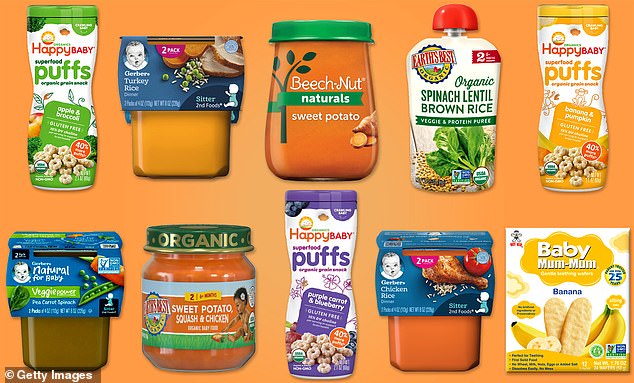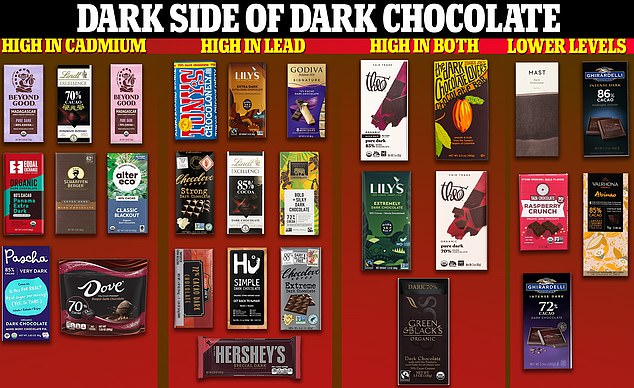More than 13,000 cases of CANCER in US every year are caused by foods laced with toxic metals including CHOCOLATE and cereal, shocking study finds
Toxic metals found in foods such as dark chocolate, green leafy vegetables and baby food have been linked to thousands of cancer cases each year in the US for the first time.
Lead, arsenic and cadmium levels in food have risen in recent years as they seep into soil and water and contaminate crops used to feed particularly vulnerable populations such as children.
For decades, these metals have been linked to cancer and other health problems, but until now there have never been any.
Now researchers have found that 13,000 cases of bladder, lung and skin cancer each year may be linked to contaminated food.
Researchers found that foods with the highest levels of toxic metals such as lead, arsenic and cadmium included baby food, root vegetables such as beets, rice and dark chocolate.

Metals occur naturally in the environment and can leach into soil and water, contaminating crops
Paradoxically, it was healthy foods such as rice, wheat and green leafy vegetables that were most likely to cause cancer.
The toxic metal cadmium – found in foods such as potatoes and dark chocolate – had a 'very high' chance of causing pancreatic cancer, which is notoriously difficult to detect and kills more than 90 percent of patients once the disease spreads.
The team called on the Food and Drug Administration (FDA) to set stricter limits for metals in food and for the food industry to adopt safer practices, as these foods have higher limits than the recommended limits. They also pushed for stronger warnings to consumers.
In January, the FDA set a lead limit of 10 parts per billion (ppb) in fruits, some vegetables and yogurt, and 20 ppb in root vegetables – including carrots, beets and potatoes – and dry grains.
The agency also stated that the food industry should limit arsenic levels in infant rice cereals to 100 ppb. According to the U.S. Environmental Protection Agency (EPA), drinking water should not contain more than 10 ppb.
The Centers for Disease Control and Prevention (CDC) recommends that daily consumption of cadmium be limited to 0.0002 milligrams per kilogram.
Dr. Felicia Wu, lead author of the study and a food scientist at Michigan State University, said: “The results of these studies have important implications for food safety regulations, public health policy and consumer awareness.”
The team analyzed human and animal studies conducted between 2000 and 2023 on the effect of lead, cadmium and arsenic on cancer and other diseases such as heart disease, kidney failure, liver toxicity and developmental delays.
They found that foods laced with metals were linked to 6,000 cases of bladder and lung cancer. Arsenic in particular also contributed to 7,000 cases of skin cancer.

Toxic metals such as lead and cadmium have been linked to several brands of baby food

The image above shows the 28 chocolate bars tested by the New York-based nonprofit Consumer Reports. They were all found to contain lead and cadmium. Consumer Reports compared the levels of the heavy metal in about an ounce of chocolate to the recommended daily exposure levels from the Californian Office of Environmental Health Hazard Assessment
Foods containing lead have been shown to increase the risk of kidney, brain, bladder, breast and stomach cancer. According to the American Cancer Society (ACS), it was most strongly linked to kidney cancer, which affects 81,800 Americans and kills 14,890 people annually.
Kidney cancer normally affects adults between the ages of 65 and 74, and is twice as likely to affect men as women. About 80 percent of patients are expected to survive for five years after diagnosis.
Lead has also been linked to developmental effects in children, which is in line with other recent research.
The CDC warns that young children exposed to lead may experience stunted development of their brain and nervous system.
About 2.5 percent of children under the age of five have been exposed to dangerous levels of lead, according to experts.
As a result, they may have delayed growth, learning, behavior, hearing and speech problems.
Lead is mainly found in beets, chocolate and baby food.
Earlier this year, the FDA warned that WanaBana children's fruit puree pouches contained high levels of lead after four children in North Carolina had “extremely high” levels in their blood.
The researchers also found that arsenic, found in baby food, seafood, rice and mushrooms, was linked to a greater chance of developing skin and bladder cancer.
Skin cancer affects more than 5.4 million Americans each year, the ACS estimates, although more than 90 percent are expected to survive after five years.
Arsenic is also 'very likely' to lead to heart disease. It has also been linked to neurodevelopmental disorders and a higher risk of infant mortality.
The researchers also evaluated cadmium, a toxic metal found in nuts, potatoes, seeds, grains and green leafy vegetables such as spinach.
Of the cancers linked to cadmium, pancreatic cancer was the only form with a 'very high' risk.
Pancreatic cancer is the third deadliest form of the disease in the United States, according to the National Cancer Institute (NCI). On average, only 12.5 percent survive after five years. Once it spreads, that figure drops to just three percent.
NCI estimates that approximately 64,000 new cases of pancreatic cancer will be diagnosed this year, along with more than 50,000 deaths.
The number of cases is increasing. In the US, the incidence of the disease has increased by one percent each year since 2000, the ACS estimates.
The disease has been called a 'silent killer' because symptoms, including jaundice and abdominal pain, are often attributed to other diseases. By the time most patients contract it, it has spread to other organs, making it more difficult to treat.
Other cancers linked to cadmium include prostate, kidney, bladder, breast and endometrial cancer.
The study comes after an October report from watchdog Consumer Reports found that a third of chocolates contained high levels of lead or cadmium, with each individually containing detectable levels of metals.
This summer, Consumer Reports also sounded the alarm after discovering that several brands of baby food, including Gerber, are still loaded with lead, arsenic and cadmium, despite the FDA recommending limiting these metals in baby food.
Some states have begun imposing stricter regulations on metals in baby food. In October, California Governor Gavin Newsom signed a bill forcing baby food manufacturers to test for metals and post the results on the products' websites.
The researchers plan to conduct additional studies on the effect of toxic metals on long-term health.
The studies were presented Tuesday at the Society for Risk Analysis 2023 annual conference in Washington, DC.
